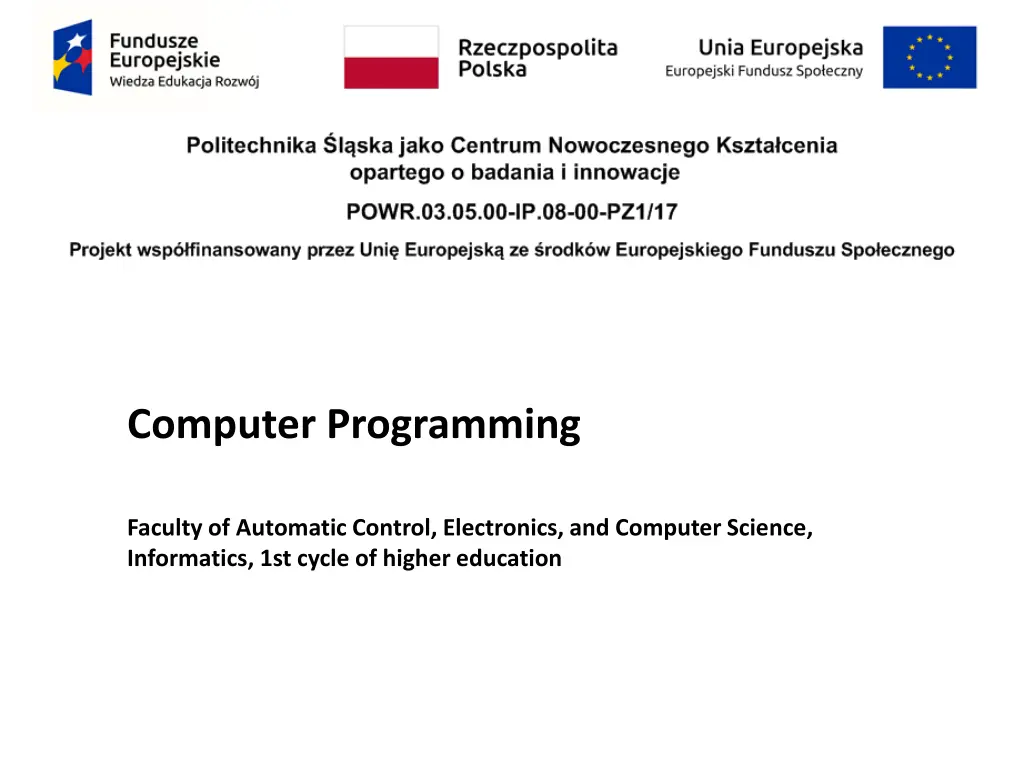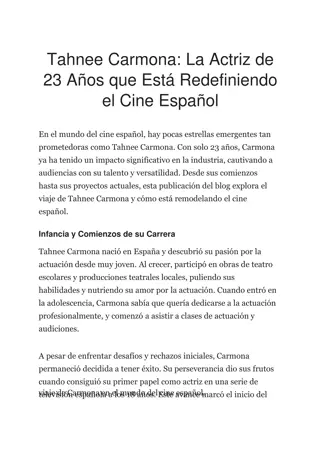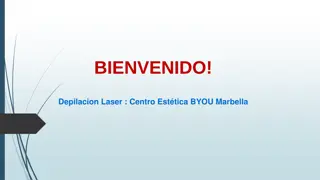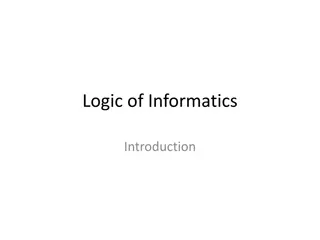
Computer Programming in Faculty of Automatic Control, Electronics, and Computer Science
"Explore the world of computer programming at the Faculty of Automatic Control, Electronics, and Computer Science through lectures and practical examples. Learn about task declaration, queue management, and chronological task ordering within the curriculum."
Download Presentation

Please find below an Image/Link to download the presentation.
The content on the website is provided AS IS for your information and personal use only. It may not be sold, licensed, or shared on other websites without obtaining consent from the author. If you encounter any issues during the download, it is possible that the publisher has removed the file from their server.
You are allowed to download the files provided on this website for personal or commercial use, subject to the condition that they are used lawfully. All files are the property of their respective owners.
The content on the website is provided AS IS for your information and personal use only. It may not be sold, licensed, or shared on other websites without obtaining consent from the author.
E N D
Presentation Transcript
Computer Programming Faculty of Automatic Control, Electronics, and Computer Science, Informatics, 1st cycle of higher education
Lecture: Repetitio est mater studiorum Roman Starosolski, Ph.D., D.Sc., Assoc. Prof.
Example (long) 1) Declare the task class that represents the tasks to be performed (e.g. entries in the schedule), which are represented inside the class objects by the description of the task (string) and by the date of the planned task (for simplicity int). Define all the methods and operators required in parts 2 and 3 of the example (see classes queue and sorted_q).
Example (continues) 2) Declare class queue that represents queues (FIFO) of tasks. Tasks in the queue should be stored in a single linked list (declare also type of the list node). Define following methods and operators:
Example (continues) 2) continues ... queue:: default constructor of the class queue copy and move constructors of the class queue destructor of the queue class assignment and move operator for the queue class method empty() that removes all the tasks from queue method contains(const task & ctr) that returns 1 if queue contains the task ctr friend stream operators that input/output the queue operator+= that inserts the task into the queue
Example (ends) 3) Declare class sorted_q, derived from class queue, which represents queues of tasks. Tasks are arranged in chronological order within the queue. Define following methods and operators: operator+= that inserts the task into the queue Method complete(queue &tobedone), that completes those tasks in the queue, that are contained in the queue tobedone. If necessary define constructors and assignment operators for the sorted_q class friend stream operators that input/output the queue
Example code 1) Declare the task class that represents the tasks to be performed (e.g. entries in the schedule), which are represented inside the class objects by the description of the task (string) and by the date of the planned task (for simplicity int). Define all the methods and operators required in parts 2 and 3 of the example (see classes queue and sorted_q).
#include <iostream> #include <string> #include <utility> using namespace std; //////////////////////////////////////////////////////////////////// class task { string todo = "empty task"; int date = 0; public: task(string, int); task() = default; task(const task &) = default; task & operator=(const task &) = default; void complete(void); int operator>(const task &); int operator==(const task &); // compares whole tasks friend ostream & operator<<(ostream &, const task &); friend istream & operator>>(istream &, task &); // compares dates };
task::task(string todo, int date) : todo(todo), date(date) {} void task::complete(void) { cout << "\ntask " << todo << " scheduled for " << date << " done successfully!"; } int { task::operator>(const task &rt) return date>rt.date; } int { task::operator==(const task &rt) return ((todo == rt.todo) && (date == rt.date)); }
ostream & operator<<(ostream &os, const task &rt) { os << rt.todo; os << ' '; os << rt.date; return os; }; istream & operator>>(istream &is, task &rt) { return is >> rt.todo >> rt.date; };
Example code 2) Declare class queue that represents queues (FIFO) of tasks. Tasks in the queue should be stored in a single linked list (declare also type of the list node).
Example code 2) continues ... queue:: default constructor of the class queue copy and move constructors of the class queue destructor of the queue class assignment and move operator for the queue class method empty() that removes all the tasks from queue method contains(const task & ctr) that returns 1 if queue contains the task ctr friend stream operators that input/output the queue operator+= that inserts the task into the queue
//////////////////////////////////////////////////////////////////////////////////////////////////////////////////////////////////////// struct q_elem { task t; q_elem * next; q_elem(const task &ctr) :t(ctr), next(nullptr) {}; }; //////////////////////////////////////////////////////////////////// class queue { protected: q_elem *head, // nullptr denotes empty queue *tail; // valid if != nullptr public: queue() :head(nullptr) {}
virtual queue & operator+=(const task &rq) // virtual!!! { q_elem *qep = new q_elem(rq); if (head) tail->next = qep; else head = qep; tail = qep; return *this; } queue(const queue &rq) :head(nullptr) { q_elem *qep = rq.head; while (qep) { (*this) += qep->t; qep = qep->next; } }
queue(queue &&rrq) : head(rrq.head), tail(rrq.tail) { rrq.head = rrq.tail = nullptr; } ~queue() { while (head) { const q_elem * qep = head; head = head->next; delete qep; } }
void empty()// leaves empty (head==nullptr) object { while (head) { const q_elem * qep = head; head = head->next; delete qep; } }
queue & operator=(const queue &rq) { if (&rq == this) return *this; empty(); q_elem *qep = rq.head; while (qep) { (*this) += qep->t; qep = qep->next; } return *this; } queue & operator=(queue &&rq) { swap(head, rq.head); swap(tail, rq.tail); return *this; }
int contains(const task & ctr) { q_elem *qep = head; while (qep) if (qep->t == ctr) return 1; else qep = qep->next; return 0; } friend istream & operator>>(istream &is, queue &rq) { task t;// requires default constructor task() rq.empty(); while (is >> t) rq += t; return is; }
friend ostream & operator<<(ostream &os, const queue &rq) { q_elem *qep = rq.head; while (qep) { os << qep->t << " "; qep = qep->next; } return os; } };
Example code 3) Declare class sorted_q, derived from class queue, which represents queues of tasks. Tasks are arranged in chronological order within the queue. Define following methods and operators: operator+= that inserts the task into the queue Method complete(queue &tobedone), that completes those tasks in the queue, that are contained in the queue tobedone. If necessary define constructors and assignment operators for the sorted_q class friend stream operators that input/output the queue
//////////////////////////////////////////////////////////////////////////////////////////////////////////////////////////////////////////// class sorted_q :public queue { public: void complete(queue &tobedone) { q_elem *qep = head; while (qep) { if (tobedone.contains(qep->t)) qep->t.complete(); qep = qep->next; } }
sorted_q & operator+=(const task &rq)// different ret. type - ok here { q_elem * const newel = new q_elem(rq); if ((!head) || (head->t > rq))// insert as first { newel->next = head; head = newel; } else { q_elem * pq = head; while (pq->next && !(pq->next->t>rq)) pq = pq->next; newel->next = pq->next; pq->next = newel; } if (!newel->next) tail = newel; return *this; }
using queue::operator=; //constructor call order makes the below line not necessary // //using queue::queue; //we've got automatic conversions to base and virtual functions, // so below-ones are not necessary: // //friend istream & operator>>(istream &is, sorted_q &rq) //friend ostream & operator<<(ostream &os, const sorted_q &rq) };
int main() { queue q1; sorted_q s1; q1 += task("task a", 20161020); q1 += task("task b", 20161020); q1 += task("task c", 20161515); q1 += task("task d", 20160505); queue q2 = move(q1); cout << "q1 " << q1 << endl << "q2 " << q2 << endl; q1 = move(q2); cout << "q1 " << q1 << endl << "q2 " << q2 << endl; q2 = q1; q1 += task("task e", 20160505); cout << endl << q1; q1 = q2; cout << endl << q1;
s1 = q1; cout << endl << s1; s1 += task("task f", 900000000); s1 += task("task g", 00000); cout << endl << s1; s1.complete(q1); cin >> s1; cout << endl << s1; cout.flush(); }
Thank you! Next lecture: STL library
Lecture plan Object-oriented programming in C++ 1. Introduction 2. Selected non object-oriented C++ extensions 3. Paradigm of object-oriented programming 4. Constructor, destructor 5. Operator overloading 6. Inheritance 7. Virtual methods, polymorphism, RTTI 8. Multiple inheritance 9. Templates 10. Exception handling 11. C++ libraries, the C++ standard library, 12. I/O stream library 13. Repetitio est mater studiorum 14. STL library 15. Strings






















